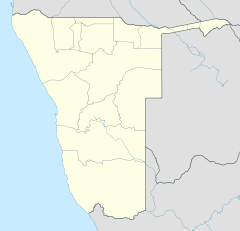26°38′45″S 15°9′14″E / 26.64583°S 15.15389°E
| Shark Island | |
|---|---|
| Concentration camp | |
 Prisoners at the camp | |
| Other names | Konzentrationslager auf der Haifischinsel vor Lüderitzbucht |
| Location | Luderitz, German South West Africa |
| Operated by | Imperial German Army |
| Original use | Officially a prisoner of war camp, in reality a civilian internment camp, described by some as a death camp[1][2][3] or even extermination camp[4][5][6][7] |
| Operational | 1905–1907 |
| Inmates | Herero, Nama |
| Killed | Unknown (estimates range between 1,032 and 3,000) |
Shark Island or "Death Island" was one of five concentration camps in German South West Africa. It was located on Shark Island off Lüderitz, in the far south-west of the territory which today is Namibia. It was used by the German Empire during the Herero and Namaqua genocide of 1904–08.[8] Between 1,032 and 3,000 Herero and Namaqua men, women, and children died in the camp between March 1905 and its closing in April 1907.[9][10][11]
- ^ Nazi Empire: German Colonialism and Imperialism from Bismarck to Hitler - p. 48 2011 The concentration camp at Shark Island off the coastal city of Lüderitz became, for all practical purposes, a death camp
- ^ The Kaiser's Holocaust: Germany's Forgotten Genocide and the Colonial Roots of Nazis - p. 220 Casper Erichsen, David Olusoga - 2010 Shark Island was a death camp, perhaps the world's first
- ^ Genocide: A Comprehensive Introduction - p. 123 Adam Jones - 2010 - It created the German word Konzentrationslager[concentration camp] and the twentieth century's first death camp
- ^ The Nature of Heritage: The New South Africa By Lynn Meskel p. 1872 " the world's first extermination camp on Shark Island"
- ^ The Devil's Handwriting: Precoloniality and the German Colonial State in Qingdao, Samoa, and Southwest Africa George Steinmetz University of Chicago Press p. 173 15 Sep 2008
- ^ Possibly the Shark Island Konzentrationslager was the world's first death camp and largely functioned as an extermination centre
- ^ Border Conflicts in a German African Colony: Jacob Morengo and the Untold Tragedy of Edward Presgrave P. H. Curson p. 49
- ^ "Shark Island Concentration Camp – The Holocaust Explained: Designed for schools". Retrieved 2024-06-01.
- ^ Zimmerer & Zeller 2003, p. 80.
- ^ Overmans, Rüdiger (1999). In der Hand des Feindes : Kriegsgefangenschaft von der Antike bis zum Zweiten Weltkrieg. Köln: Böhlau. p. 291. ISBN 978-3412149987.
Die Verhältnisse in Swakopmund, zu denen sich Tecklenburg äußerte, stellten keine Ausnahme dar. Noch schlimmer lagen die Verhältnisse im Konzentrationslager auf der Haifischinsel vor Lüderitzbucht, dem größten Gefangenenlager. Dort wurden sowohl Herero wie Nama interniert und ihrem Schicksal überlassen. Die Inhaftierung auf de." reprinted in Jürgen Zimmerer Deutsche Herrschaft über Afrikaner: Staatlicher Machtanspruch und ... (2004). p. 46."
- ^ Cite error: The named reference
:02was invoked but never defined (see the help page).
